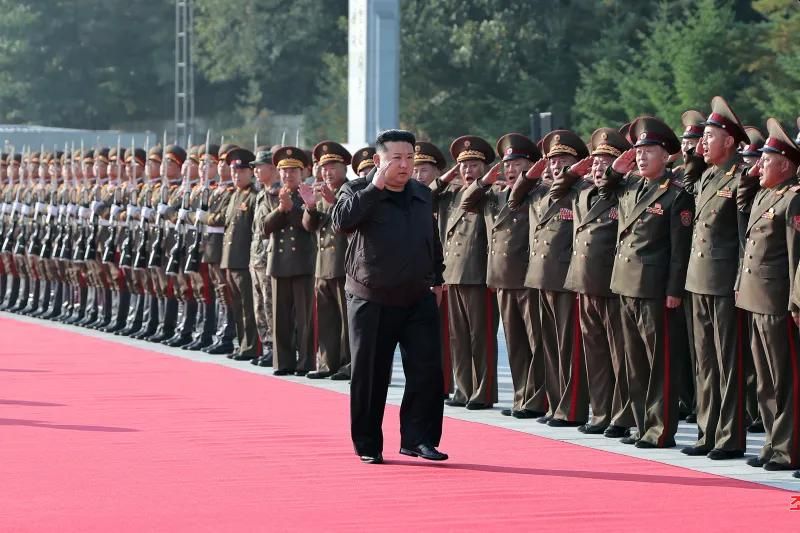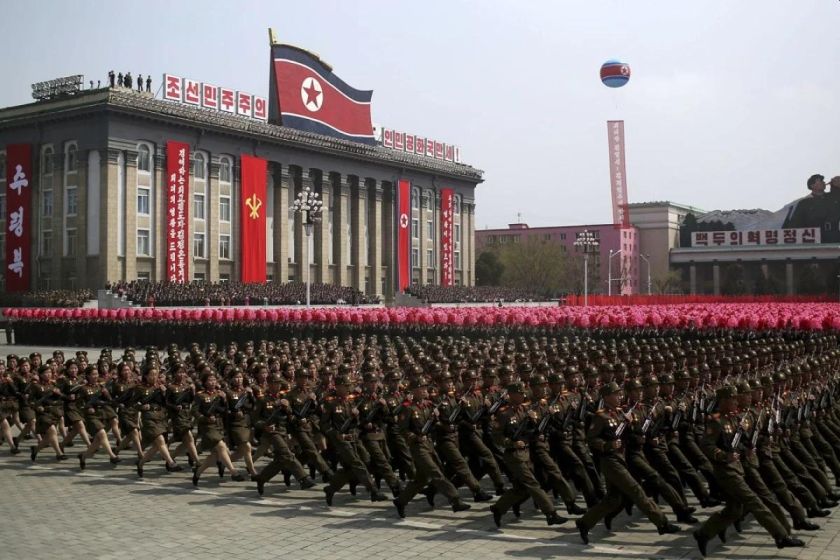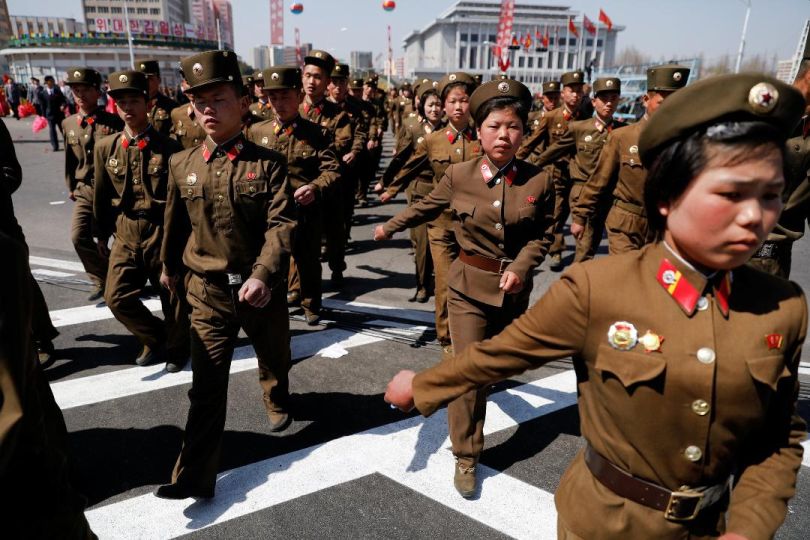By Eric Vandenbroeck and co-workers
Last month, the White
House confirmed that North Korea—a country with few
allies and little money—had sent thousands of soldiers to join Russia in its
war against Ukraine. Pyongyang was already supplying Moscow with weapons:
according to The Times of London, half of Russia’s shells used
in the war have come from North Korea. But sending personnel marks a new level
of coordination. There are other signs of warming ties, too. In June, Russian
President Vladimir Putin made his first trip to North Korea in over two
decades.
That proximity has
irked China, North Korea’s main backer.
Chinese officials fear that Russia’s influence over the insular dictatorship is
growing at China’s expense. They also worry that the United States and its
allies in Europe and Asia will strengthen military cooperation in response to
Russia and North Korea’s newfound closeness. Over the past year, Beijing has
chosen to react to Pyongyang’s collaboration with Moscow by publicly courting
North Korea’s adversaries. For instance, in May, China held a trilateral summit
with South Korea and Japan after a five-year hiatus. On the same day in June
that Putin visited Pyongyang, Chinese and South Korean officials held a
security dialogue in Seoul—the first meeting in nine years.
This seeming friction
between China and North Korea has tantalized many Western security analysts,
who have argued that the United States and its allies should try to drive a
wedge between China and North Korea. Such an effort, however, would be futile. Despite
signs of tension between the two countries, North Korea is overwhelmingly
reliant on China. Nearly all of its trade, for
instance, is with China. The countries have not always seen eye to eye over the
past 75 years, but their relationship has never come close to splintering.
Instead of focusing on what could divide North Korea from China, the United
States should collaborate with the Chinese government to rein in North Korea’s
volatile behavior. The United States and China are ultimately invested in
maintaining peace on the Korean Peninsula. Working together to restrain the
North Korean regime is the best way to achieve it.

Longtime Frenemies
Although North Korea
is often imagined as a mere satrap of China, it is not, in fact, a Chinese
vassal, and it has long sought to achieve a great degree of autonomy in its
foreign policy. The two countries have endured many moments of friction in
their relationship. In August 1956, Kim Il Sung, North Korea’s ruler and the
grandfather of the current leader, fumed at Chinese and Soviet involvement in
an attempted coup against him and bristled at subsequent Chinese and Soviet
efforts to dissuade him from purging those officials who he believed were
involved in the plot. During China’s Cultural Revolution in the 1960s, Chinese
Red Guards labeled Kim a “counterrevolutionary dictator.” The fact that China
tolerated open criticism of North Korea’s leadership put further strain on the
relationship between the two governments. Back then, Pyongyang also played
Beijing and Moscow against each other. During the rapprochement between China
and the United States in the 1970s (which followed the split between China and the
Soviet Union), North Korea hosted Soviet naval ships in its ports and allowed
Soviet fighter jets to enter North Korean airspace. Throughout the
1980s, in response to North Korea’s tilt toward Russia, China increased its
diplomatic contacts with South Korea.
Relations between
China and North Korea hit another low point in 1992 when China formally
established diplomatic relations with South Korea against Kim’s wishes. China
further irked North Korea by joining international sanctions against
Pyongyang’s missile and nuclear weapons programs in 2006. Pyongyang, for its
part, often acted without consulting Beijing on matters that could seriously
affect China’s security. In 2006, following North Korea’s first nuclear test,
Beijing accused Pyongyang of “brazen” action, a term rarely used in official
Chinese statements. North Korea’s nuclear tests violated a treaty between the
two countries that requires them to “consult with each other on all important
international questions of common interest.” In 2017, in a moment of great
tension between North Korea and the first Trump administration, Beijing openly
criticized Pyongyang. An editorial in the Global Times, a Chinese
state-run newspaper, argued that “North Korea’s possession of nuclear weapons .
. . seriously harms China’s national security” and therefore violates their
treaty.
Over the past year,
there have been signs that China and North Korea have entered another rough
patch. Beyond lending troops to Russia, North Korea has signaled its
frustration with China over what it perceives to be a lack of diplomatic and
economic support. In 2023, North Korean leader Kim Jong Un, for example, gave
notably more attention to Russia’s defense minister than to China’s envoy at
the 70th anniversary of the Korean War armistice. In July 2024, North Korea
stopped disseminating its state television broadcasts from a Chinese satellite
and started using a Russian one. Last month, when Kim and Chinese leader Xi
Jinping exchanged messages marking the 75th anniversary of diplomatic relations
between their two countries, Kim omitted traditional niceties, including “dear”
and “respectful leader,” and terms that show bonds between the two countries,
such as “blood-forged socialism,” in his letters to Beijing. These subtle
symbolic and rhetorical shifts suggest that North Korea is dissatisfied with
China.
Meanwhile, China has
used economic policies to express its frustration with North Korea for its
current alignment with Russia and its refusal to consult with China over
military provocations, such as weapon tests. Over the past year, Beijing has
cracked down on North Korean smuggling, restricted the sale of North Korean
seafood in China, and made it harder for Chinese boats to illegally fish in
North Korean waters. (Chinese fishermen used to pay Pyongyang for the
privilege, with Beijing turning a blind eye.) According to The Korea
Times, in July 2024 Beijing demanded that Pyongyang recall North Korean
workers in China—numbered in the tens of thousands—so that China could comply
with UN Security Council Resolution 2937, which called for the repatriation of
North Korean laborers. The move would further cut off North Korea from foreign
currency that it desperately needs.
These punishments are
especially painful since North Korea’s economy has been severely strained by
international sanctions, the COVID-19 pandemic, and economic mismanagement.
Between 2016 and 2022, the country’s exports fell by 94 percent and its imports
decreased by 61 percent. North Korea needs all the help it can get, but China
has been doing the opposite: intensifying sanctions. Unsure of China’s
intentions, North Korea has turned to Russia for economic, diplomatic, and
military cooperation.
Through these
punitive measures, China is not just trying to chastise Pyongyang for cozying
up to Russia; it’s also seeking to curry favor with the United States and
Europe. Since the summit between Xi and U.S. President Joe Biden in November
2023, Beijing has appeared determined to stabilize U.S.-Chinese relations so
that it can still attract foreign investment from Western countries and
maintain strong trading ties with them. In this context, North Korea’s
belligerence toward South Korea and Japan and its military support of Russia
has become a liability for China’s engagement with the West, because the United
States and Europe see China as North Korea’s patron, and therefore as partly
responsible for Pyongyang’s behavior.

A Needy Neighbor
Some Western scholars
have argued that tensions between China and North Korea present the United
States and its allies with a chance to push the two countries apart. Such
thinking, however, is wishful. Despite moments of discord, ties between North
Korea and China are resilient. North Korea has been economically dependent on
China for its survival since the collapse of the Soviet Union, and it grew even
more reliant on Beijing after the UN ramped up sanctions on North Korea’s
nuclear program in 2017. China has effectively become a lifeline for North
Korea, supplying essential goods such as food, clothing, fertilizer, machinery,
and construction materials—nearly everything that sustains the daily lives of
North Koreans and the country’s industries. Between 1994 and 2023,
North Korea accumulated a trade deficit with China of more than $20 billion.
North Korea’s 2024 treaty with Russia expands trade between the two countries,
but it doesn’t reduce Beijing’s leverage over Pyongyang in a meaningful way. In
2023, China accounted for 98 percent of North Korea’s official trade volume.
When tensions ratchet
up, the two countries quickly mend fences. Xi, for example, didn’t meet with Kim
once between 2012 and 2017 but met with him five times from 2018 to 2019, after
a summit between Kim and U.S. President Donald Trump was announced (without
Beijing’s approval). Even though China maintains enormous leverage over its
neighbor, it refrains from playing hardball so as not to push North Korea into
the arms of Russia or even the United States. When China joined UN sanctions on
North Korea in 2006—in response to North Korea’s first nuclear test—Pyongyang
reacted by holding bilateral talks with Washington without Beijing’s approval.
China has since made an effort to avoid being bypassed
by maintaining close channels of communication with Pyongyang. China also fears
that applying pressure to North Korea, which is already strained by an economic
crisis, could push the Kim regime to the brink of regime collapse. It is highly
uncertain—even to China’s leadership—how Pyongyang would act if backed into a
corner. In the worst-case scenario, Pyongyang may resort to attacking South
Korea to deliberately create an external crisis, forcing China to intervene on
North Korea’s behalf. Therefore, Beijing has to
carefully assess the risks when considering how much it can push North Korea.
In the current era of
U.S.-Chinese strategic competition, North Korea’s value to China extends beyond
its role as a buffer zone between Chinese and U.S. forces. From Beijing’s
perspective, during a conflict with the United States over Taiwan, maintaining
close ties with North Korea is advantageous because Pyongyang can help tie down
U.S. troops in the region by keeping open the possibility of another war.
However, it remains uncertain whether Beijing would pre-coordinate with North
Korea before taking military action against Taiwan, or if they would even want
to coordinate such involvement if it could lead to conflict spreading from the
Taiwan Strait to the Korean Peninsula.

Go Smaller
Chinese strategists
are understandably wary of attempts by Western countries to exploit tensions
between China and North Korea. In July 2024, a spokesperson for the Chinese
Ministry of Foreign Affairs accused the South Korean press of spreading
“groundless rumors” about rifts in the Chinese–North Korean relationship and
reaffirmed the bond between the two countries. In reaction to North Korea’s
growing ties with Russia, the United States and its allies in East Asia might
strengthen their military cooperation—something China perceives as a threat to
its own security. In this scenario, any effort by the United States to exploit
tensions between China and North Korea backfire. The more Beijing believes that
the United States is trying to weaken Chinese influence by driving a wedge
between China and North Korea, the more valuable North Korea becomes to
China—which may be exactly Pyongyang’s calculus.
To avoid such an
outcome, the United States and its allies should focus on identifying interests
they share with China: namely, preventing the outbreak of a war on the Korean
Peninsula. Expecting Beijing to take extreme measures, such as suspending oil supplies
or humanitarian aid to North Korea, is unrealistic. Instead of driving China
and North Korea apart, Washington should try to capitalize on Beijing’s power
over Pyongyang by urging China to clearly communicate two redlines to its
partner. First, North Korea must refrain from directly assaulting South Korean
lives and property, as it did in the 2010 Cheonan torpedo
attack and Yeonpyeong Island shelling. Since these incidents, South Korea’s
military doctrine has become far more offensive. Any North Korean attack, even
on a limited scale, would trigger South Korean retaliation, and could spiral
into all-out war. Second, North Korea must avoid conducting its seventh nuclear
test. A seventh test would likely be geared toward developing a nuclear weapon
with a small yield that would be easier to deploy. Such a test would be a sign
of China’s weakening influence over Pyongyang and could spur Seoul to try to
acquire nuclear weapons of its own—a position that both South Korea and the
United States officially oppose but is gaining traction in Western policy
circles.
U.S. efforts to drive
a wedge between China and North Korea could backfire, potentially strengthening
their autocratic alliance. To secure meaningful cooperation from China, it
would be more effective for Washington to keep its requests specific, realistic,
and geared toward achieving shared interests. A more focused approach is likely
to yield better results.
For updates click hompage here